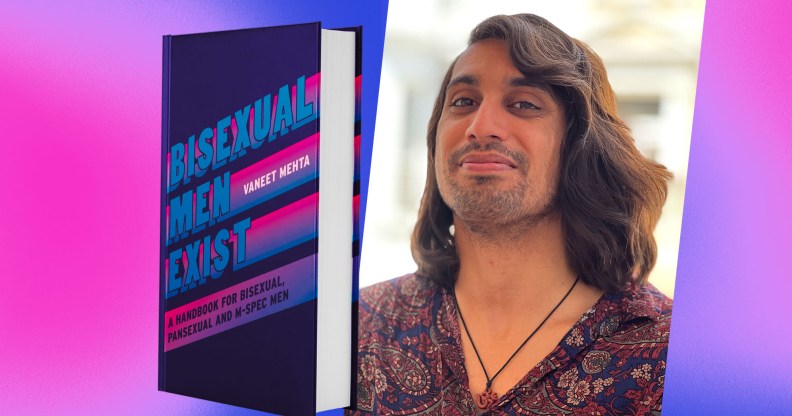‘Bisexual men have a lot to say’: Vaneet Mehta on fighting biphobia and uplifting the m-spec community

Author of Bisexual Men Exist, Vaneet Mehta (Envato, Jessica Kingsley Publishers)
Amid calls for greater media representation of bisexuality, author Vaneet Mehta’s powerful new book Bisexual Men Exist arrives at a pivotal time.
Born from the viral #BisexualMenExist campaign to raise awareness of the mistreatment of bisexual men and promote positivity within the community, Mehta’s book navigates a range of topics such as coming out, dating and relationships and mental health, while sharing personal stories in a bid to help validate and empower m-spec (multi-gender attracted spectrum) men.
It’s a guide that’s sorely needed. Despite the 2021 England and Wales census showing that just as many people identify as bisexual as they do gay or lesbian, societal attitudes towards towards bisexuality are still riddled with harmful stigmas and stereotypes, with bisexual men frequently labelled as villainous, immoral or secretly gay.
“Bisexual men have a lot to say, but don’t often get that voice. They are not heard as much as other demographics within the LGBTQ+ community,” Mehta tells PinkNews.
Although LGBTQ+ representation has seen tremendous strides over the past few years, bisexual erasure is still present within the film and television industry, with few nuanced male characters on our screens who have the capacity to be attracted to more than one gender.
Actors such as Kit Connor, who shot to fame in Netflix’s hit LGBTQ+ drama Heartstopper last year, have called out the “shockingly low” proportion of bisexual men on TV in the hope of moving the needle on media representation.
Mehta points to characters such as Connor’s character Nick Nelson and Stephanie Beatriz’s badass detective Rosa Diaz in Brooklyn Nine-Nine as positive bisexual representation, but knows there’s much more work to do.
“Every time I see progress, I see something taking us back a step at the same time,” he continues, stressing the importance of starting conversations around the the bi male experience.
It’s not just the media where bisexuality is depicted inaccurately or erased together, though. All too often, bisexual men are missed out in conversations around LGBTQ+ healthcare, which can in turn lead to a detrimental impact upon their mental health.
“Because of that structural void in the knowledge of bisexual men,” Mehta explains, “it often means that we aren’t getting quality care”.
Mehta also points to research into the sexual health of gay and bisexual men in LGBTQ+ spaces, which can often be exclusive of bi people.
“Our issues aren’t just the same as gay and lesbian people – our issues can’t be flattened in that way”
“How are those people being reached? How are we finding out what their issues are if we’re always targeting within our bubble?”
Mehta too has faced his fair share of negative experiences because of his sexuality. When he first came out, he remembers being repeatedly questioned about his identity.
“I really thought that I was going to be in a space that would really, truly accept me,” he admits.
Mehta’s experience is not unique, explaining that another of his friends was told they were “queerbaiting” for how they identified at an LGBTQ+ bar.
Given the erasure and mistreatment faced by bi people, it hardly seems surprising that a 2020 report from Stonewall, the UK’s leading LGBTQ+ organisation, found that only 20% of bi people are out to all their family, compared to 63% of gay men and lesbians.
Crucially, Mehta’s book takes an intersectional look at bisexuality through its exploration of race and bisexuality, pansexuality, the Ace and Aro spectrum and transgender identity.
Despite the challenges faced by bisexual men, Mehta is positive that they can find “pride” and move towards a brighter future with strong allyship, which comes from creating safe spaces for bisexual people and making concerted efforts to amplify their voices.
Urging people to seek out resources created by and for bi people, Mehta mentions his own inspirations such as UK Black Pride, Bisexual Index, Bi Survivors Network and author of the Bi The Way, Lois Shearing, who are “all doing really incredible work making sure we are visible”.
As for what he hopes readers will take from the book, Mehta is optimistic it will go some way to helping bisexual people unpack some of the issues they may be experiencing, and “maybe feel less alone”.
Most importantly, though, he hopes it will help them understand that that “our issues aren’t just the same as gay and lesbian people. Our issues can’t be flattened in that way”.
Bisexual Men Exist is available to buy now.
How did this story make you feel?

